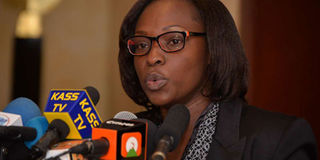The crucial role police, medics and lawyers play in sex cases

Physicians for Human Rights, Kenya coordinator, Christine Alai, says when medical evidence collection is properly done in a rape investigation, justice can be achieved. PHOTO | FILE | NATION MEDIA GROUP
What you need to know:
The medic should inform the police officer investigating of the samples collected and maintain a record of the chain of custody by signing for the samples.
However, medical practitioners are not trained for such kind of intricate processes that play a significant role in collection of evidence.
- There is also need for the government to provide the resources required to purchase rape kits, which support health professionals to collect any type of relevant evidence.
Sexual violence is considered different from other forms of violence — such as assault— because of its complex and misunderstood nature.
At its heart are underlying gender discrimination factors, as well as issues of control, power and dominance. Sexual violence hardly receives as much support as other forms of violence. Many survivors don’t report the crime to police.
Lawyers, human rights activists and those who work with survivors of sexual violence are raising the alarm over the fact that a lot of the crime goes unpunished because survivors do not report such violence.
PROTECTION
In Kenya, there are very few safe shelters for survivors of sexual violence, mostly for children. Those that allow women, only do so for a short time. “The Witness Protection Act caters only for victims who are witnesses in legal proceedings, not those who report at the beginning. Again, the Victims Protection Act is not fully operationalised to the extent where it provides meaningful protections,” says Christine Alai, the Kenyan head of US-based Physicians for Human Rights.
In the event that rape survivors come forward, there are hardly enough resources provided by the government for the free medical treatment that is provided for in section 35 of the Sexual Offences Act and detailed in the Sexual Offences (Medical Treatment) Regulations, 2012.
According to the Act, a victim, suspect and a person convicted or witness of a sexual offence has the right to free medical treatment in a public hospital. However, activists and advocates of survivors note that these laws have not been accompanied by corresponding resources.
PYSCHOLOGICAL
The Act also states that a police officer who is on duty during the reporting of the sexual offence should notify a medical practitioner and refer the victim to the medical practitioner. Additionally, the medical practitioner is required to conduct a full medical-forensic examination on the victim, offer counselling, complete the Post Rape Care form and psychological assessment forms, and collect and preserve the necessary forensic samples.
The medic should also inform the police officer investigating of the samples collected and maintain a record of the chain of custody by signing for the samples.
However, medical practitioners are not trained for such kind of intricate processes that play a significant role in collection of evidence.
“We observe a significant gap in the collection of forensic evidence by the clinicians. Medical forensic evidence is not the only type of evidence available, but it is its value that is critical. It is evidence obtained by experts with unique skills and it is scientific evidence,” says Ms Alai.
EVIDENCE
Medical practitioners, advocates agree, bring in unique skills and have credibility and medical evidence that is difficult to controvert in court. Medical evidence makes a case stronger and the victims are more likely to get justice. This is why activists are calling for doctors and medical practitioners to be trained to properly identify evidence and learn how to preserve it to make it to a court of law. Ms Alai says that evidence from previous cases shows that when this critical process of medical evidence collection is properly done, one always yields significant results in a court of law.
The proper implementation of section 35 of the Sexual Offences Act, according to Ms Alai, is the bedrock of the way forward in ensuring justice for rape victims.
“We must ensure that medical practitioners are well trained -- right from the academic level -- because as at now, they are not taught how to collect evidence for sexual violence cases,” she says.
There is also need for the government to provide the resources required to purchase rape kits, which are the varied tools that support health professionals to collect any type of relevant evidence.





